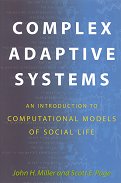This book provides the first clear, comprehensive, and accessible account
of complex adaptive social systems, by two of the field’s leading authorities.
Such systems—whether political parties, stock markets, or ant colonies—present
some of the most intriguing theoretical and practical challenges confronting the social sciences.
Engagingly written, and balancing technical detail with intuitive explanations,
Complex Adaptive Systems focuses on the key tools and ideas that have emerged in the field
since the mid-1990s, as well as the techniques needed to investigate such systems.
It provides a detailed introduction to concepts such as emergence, self-organized criticality,
automata, networks, diversity, adaptation, and feedback.
It also demonstrates how complex adaptive systems can be explored
using methods ranging from mathematics to computational models of adaptive agents.
John Miller and Scott Page show how to combine ideas from economics, political science,
biology, physics, and computer science to illuminate topics in organization, adaptation,
decentralization, and robustness.
They also demonstrate how the usual extremes used in modeling can be fruitfully transcended,
allowing the investigation of systems composed of moderate numbers of interacting and thoughtful,
but not perfect, agents across a variety of important domains.
Finally, they outline a twenty-first-century research agenda for the social
sciences based on these ideas.


